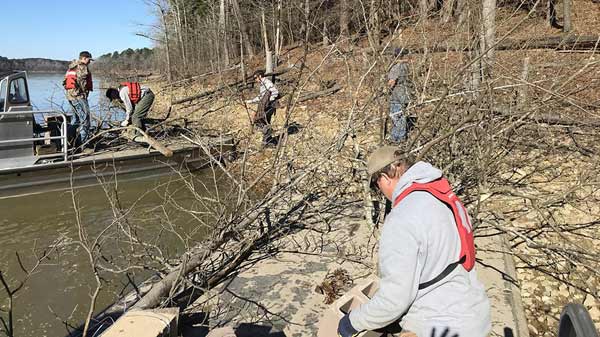
KIRBY — Last week, 21 biologists and staff from the Arkansas Game and Fish Commission worked with staff from the U.S. Army Corps of Engineers Greeson Project Office and Daisy State Park to cut, drag and sink more than 1,000 trees in 101 locations at Lake Greeson in southwest Arkansas. The trees will serve as habitat for crappie, bass and other sport fish and will offer anglers excellent locations to target on the aging reservoir.
Greeson has seen regular habitat improvements since about 2007 when regional biologists worked with local contractors to build fish attractors made of river cane, commonly called “crappie condos” or “bamboo buckets.” According to Colton Dennis, AGFC fisheries habitat biologist, this project was much larger and should see longer-lasting results.
“We’ve conducted two of these large-scale reservoir habitat projects per year since 2016. Staff from across the state converge on a single lake to combine our efforts and equipment to make a greater impact on the fishery,” Dennis said. “Lake Greeson normally gets three bamboo buckets at 65 sites added per year, which typically will last three to five years. Not only did we use more than 1,000 trees with an average of 10 trees per site, but they should also last much longer.”
Most trees used in this project were sweetgum, water oak and eastern redcedar. Crews of workers from the AGFC and Corps cut trees, then bundled, dragged and deployed them around the lake using habitat barges.
“Daisy State Park also really stepped up for the project,” Dennis said. “They cut about 350 trees, mostly cedars, from their campgrounds that needed to be removed and had them ready for us to drag into the lake as well.”
The attractors were placed at many of the old “crappie condo” locations, but habitat crews also created a few new sites in areas that would be most beneficial to fish and anglers.
The addition of woody complex cover offers many species of baitfish shelter as well as offering game fish ambush points to feed. Just as the game fish are attracted to the concentrated bait, anglers will be attracted to the concentrations of game fish the habitat provides.
“We plan to have the coordinates for all 101 habitat sites listed on the AGFC’s Interactive Map and downloadable fish attractor files in the near future, so anglers can begin taking advantage of the increased angling opportunities. We’ve already received reports that fish are using the new cover.”
The AGFC Interactive Map is available at www.agfc.com/en/resources/maps. Downloadable files of all fish attractor GPS coordinates are available at https://www.agfc.com/en/fishing/where-fish/fish-attractors/.
